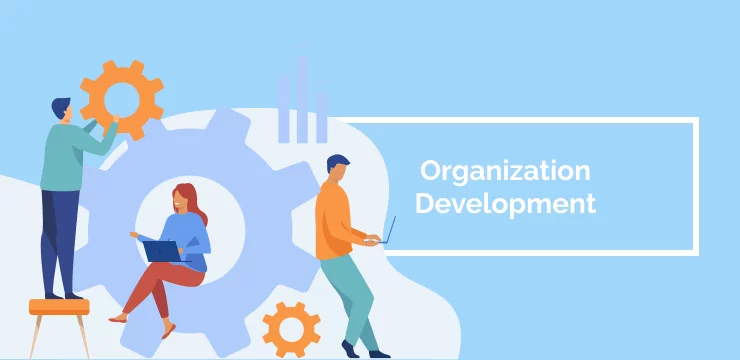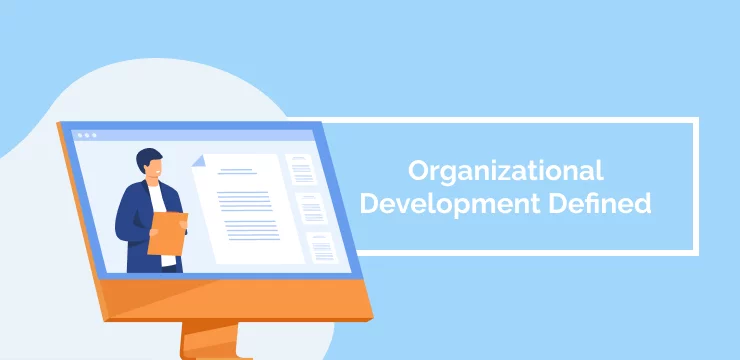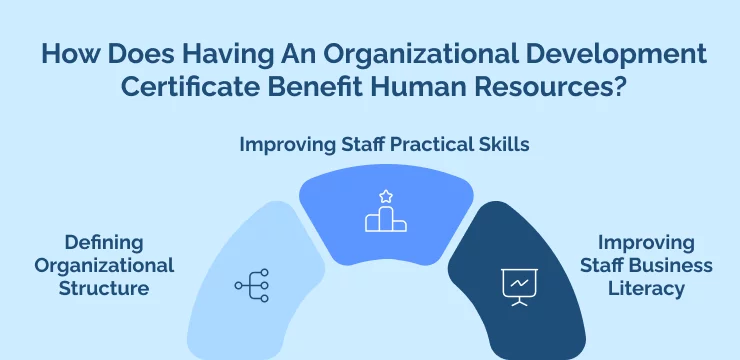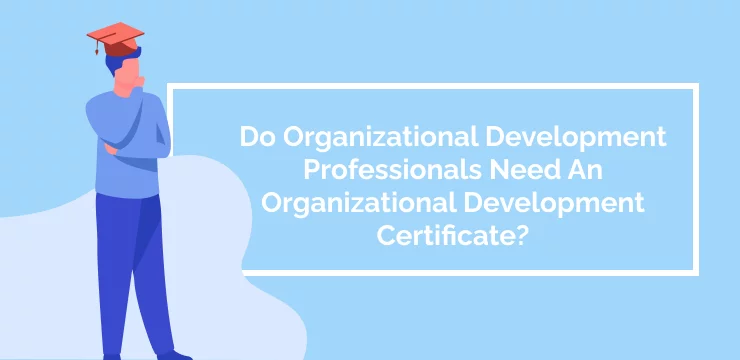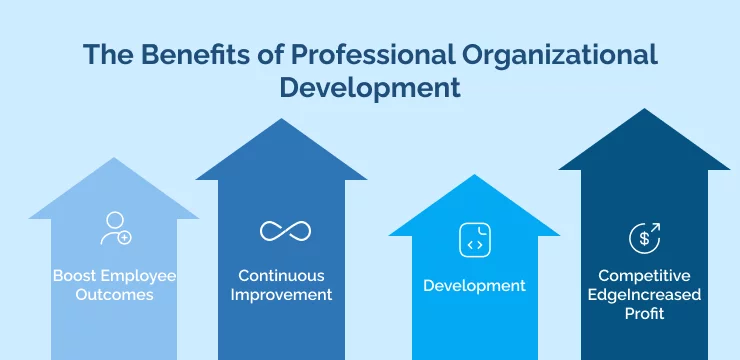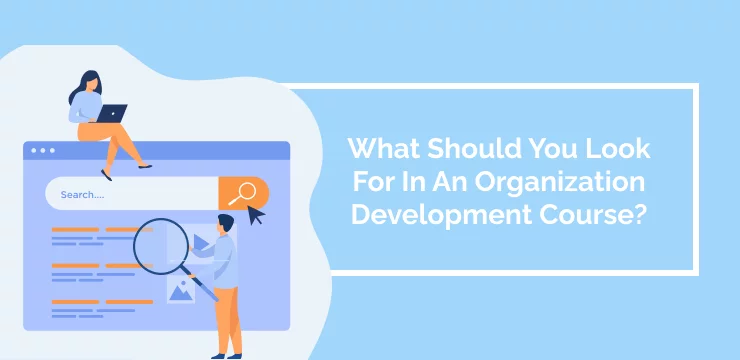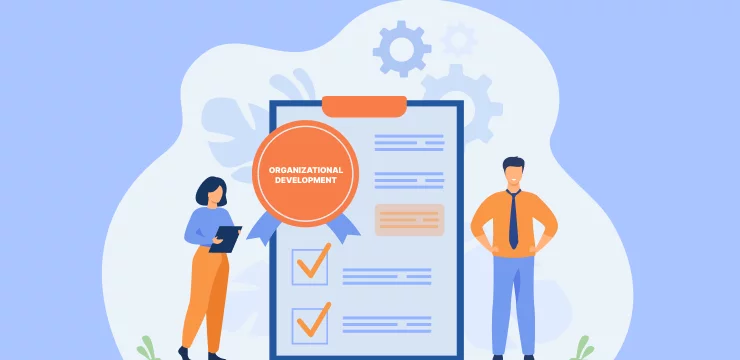
Organizational development (OD) (LINK) is an evolving term in business contexts, owing to the continuous innovation necessary to stay competitive within the current business landscape.
OD is the process involved in improving organizational efficiency. This description begins to scratch the surface of what OD is capable of and can only offer a foundational understanding. Let’s delve deeper into OD as a complex behavioral science, beginning with a definition of change management and how it differs from OD.
Change Management vs. Organizational Development
Change management and organizational development appear to be very similar terms. But when you look beneath the surface, they are subtly different in what they aim to achieve.
Change management supports staff to engage with often radical changes in a company. Organizational development involves gradual changes to improve organizational effectiveness and efficiency.
Organization Development
Organization development is the older term initially used for the current term organizational development. Organization development was originated by Bradford after the second world war and refined by Kurt Lewin into the four models we know today as:-
- Action research model
- Lewin’s Three Stage Model
- Force Field Theory And Analysis (FTP)
- Group Dynamics
An OD professional uses these models to perform organization development interventions as part of their process. Now let’s look at a more detailed definition of organizational development.
Organizational Development Defined
If you’re familiar with terms like change management, you will already know the basics of organizational development. The core of the organizational development process is increased efficiency through change. The desired outcome of this is optimal organizational effectiveness.
But organizational development refers explicitly to the changes occurring at the organizational level for organizational performance improvement driven by shareholders. Although we can include individual and group interventions within this, they are all achieved from the organizational perspective.
The definition of organizational development comes in three sections:
- Uses a critical/ science-based process – Scientific and intensive market research is the basis for organizational development.
- Embeds the skills to change within the staff to make the organization more effective – The staff’s readiness for and engagement with change defines the success of organizational development. Human resources departments are essential in supporting this aspect of OD.
- Creates, refines, and builds on structures, processes, and strategies – Reaching organizational development goals increases efficiency and company sustainability within the market.
These processes must be followed methodically for the organizational development process to be successful, with a maximum yield of efficiency and employee productivity for growth and profits.
Organizational development processes shift to ensure companies meet goals. This process sounds simple enough, but the approach is misleading as employees resist change. For this reason, organizational development theory and practice constantly change.
How Does Having An Organizational Development Certificate Benefit Human Resources?
Human resource management is a complex balancing act of meeting the needs of the organization and the individual staff member. There is also the subject of interpersonal relationships and how to support individuals to fulfill their organizational tasks.
Change penetrates our psyche, and its potency has a far greater reach than on a surface level. We’re creatures of habit, so we tend to resist anything threatening our environment and our sense of the status quo.
Organizational development can be executed as system implementation and planning of projects, aiming to improve efficiency. The best way to start is to employ systems thinking approach to organizational change by identifying weaknesses. Organizations must tackle these weaknesses head-on to provide clear direction on what needs to be changed and how the change needs to take place.
The challenge of integrating OD into HR departments is also its strength. HR teams design structures and tools to support individuals to achieve the tasks of their role in an operational way. However, OD is the opposite, focusing on improving organizational culture and structures from a strategic perspective.
When an experienced graduate of an organization development certification program joins an HR team, they can advise and support ways to blend the individual and the organization for better OD outcomes. Let’s zoom in on each of the benefits in detail.
Defining Organizational Structure
An OD consultant uses OD to define which staff fills specific roles in an individual, group, and organizational context. HR professionals can learn from this approach to determine a company’s structure as one of the following types:-
- Simple
- Functional
- Bureaucracy
- Matrix
- Virtual
- Hybrid
HR teams can base the appropriate structure type for a company on what the company needs regarding profitability, efficiency, projected metrics, and desired deliverables. The HR team can use each structure’s advantages and disadvantages to determine the best one for the organization. This process allows the HR team to see the company from a more organizational context, augmenting the skills learned to support individuals.
Improving Staff Practical Skills
Organizations and the staff within a competitive market must maintain training to the highest level in a culture of professional development and ongoing, individual-lead learning.
Staff will stay at a company that helps them grow, and OD professionals can support HR teams to ensure this happens. OD professionals can support HR to construct learning efficiently with an attractive and effective program of courses delivered in a consistent curriculum suited to the organizational culture and needs.
For the HR staff, an OD professional can support their knowledge, skills, and abilities (KSAs) in employment law, regulatory compliance, benefit design, compensation practices, human resource information systems, and more HR technologies.
Improving Staff Business Literacy
All staff within an HR department need to be aware of OD’s central principle of understanding your organization’s position in the market. An HR staff who does not understand the financial implications of profit gain and loss within their organization limits their ability to support the organization to success.
OD professionals can teach HR staff to ask themselves critical questions as metrics for success, such as:-
- What are the core competencies of our organization?
- What is our current financial status?
- What are the obstacles and challenges of our organization and our competitors?
- Who are our customers or clients, and why do they come to us over competitors?
- What is our competitive edge?
In these ways, OD professionals holding a certification program qualification can support HR staff to view their role in a broader context. Organizational factors, such as structure, culture, and finances, help improve organizational development objectives and efficiency.
Do Organizational Development Professionals Need An Organizational Development Certificate?
Organizational development projects should be led by OD consultants, as they will most likely have completed an organization development certification program. Instructors train these individuals to lead change initiatives and understand how to approach change from a professional perspective.
But do you need someone with an organizational development certificate to lead organizational development? The answer is a resounding yes. In today’s fiercely competitive industry, organizations must pounce on anything that will gain an advantage.
A qualified employee with organizational development certification can leverage their expertise to benefit the organization, providing they have experience in the field.
The theory is one thing, but having a practical understanding of things is another story altogether. By employing someone to lead your organizational development with a combination of theory and practical experience, you’ll be more able to optimize resources and produce faster business results.
But how will your organization benefit from a change leader with an organizational development certificate?
The Benefits of Professional Organizational Development
Boost Employee Outcomes
Organizational success is all about having the right employees. Your workforce can make or break your company, where their desire to succeed will directly influence productivity.
A leader with an organizational development certificate will have the requisite skills to boost employee morale. They can maximize staff potential, having developed the hard and soft skills necessary to unite teams towards common goals.
They can achieve this by running workshops, employee engagement initiatives, and promoting a work-life balance across the board. When the staff sense that the leadership truly values their opinions, they gain an enhanced sense of self-worth and are more likely to embrace change.
If you’re looking to boost your esteem further, why not try one of these exercises?
Continuous Improvement
Staff trained in organizational development can ensure a continuous improvement philosophy at the company’s core.
This action creates a cycle of improvements where strategies are not just implemented but readily improved too. By embodying a proactive approach to change, it can be modified based on individual factors and ultimately executed for maximum impact.
Workers with an organizational development certificate understand the value of regularly evaluating change initiatives and will focus on how to improve them.
Development
A trained leader will be keen to share skills with their team, accelerating the rate of organizational development. With advanced, two-way communication, an experienced leader can influence employees to adopt positive behaviors, positioning them to adapt to a disruptive market.
The best way for employees to evolve with the times is by enhancing their skill set, which is often necessary considering the increasing demands placed on workers. When market requirements evolve, so should employees so they can align their knowledge base with the organization’s needs.
Strong leadership does all it can to train its team, giving them the competencies they need to improve productivity.
Competitive Edge
If other organizations have hired the best change leaders imaginable, how do you expect to cope when you allocate a regular staff member? Though they might know the organization inside-out, will they have the tangible and intangible qualities to take your organizational development to the next level?
To achieve both of these aims in one, why not sponsor training in-house allowing a suitable candidate to acquire an organizational development certificate to advance their career? The outcome is a leader who understands the culture and has a skill set to implement strategies with minimal risk.
Including an internally trained OD professional enables any organization to remain competitive in a disruptive business environment.
Increased Profit
The right organizational development strategy will send positive shockwaves through a company. Obstacles preventing your organization from flourishing will be eradicated, achieving a long-term direction and building competencies that ultimately improve the bottom line.
A happy workforce within a productive, open culture helps organizational development initiatives generate more profitable opportunities and contribute to sustainable growth.
With suitably qualified leadership, an organization can secure higher revenue streams and develop a strategy open to continuous improvement. And with McKinsey reporting a threefold increase in return to shareholders for the top quartile health organizational cultures, the link between profit increase and culture is proven.
What Should You Look For In An Organization Development Course?
Many OD courses are available today, offering students several programs of study focusing on OD. The nearest university may offer OD courses with highly trained instructors if a staff member is interested in face-to-face education to become an OD professional. This route will usually be at a higher cost than online courses.
Alternatively, much of the online training available today allows students to engage in the curriculum, develop their knowledge, and further their careers from the comfort of their desks at work or home.
Look for courses that include the following key concepts of OD to ensure you get the best out of the system, whether learning online or via a physical classroom in a university setting.
- Leadership development
- Organizational analysis
- Systems thinking
- Change management
- Change initiatives
- Organization development intervention
Suppose the curriculum of an organization’s development certification program includes these topics and has a positive reputation. In that case, it should be worth an organization’s investment to upskill an employee for the role of OD professional.
Organizational Professionals: Essential For Today’s Market
Experienced and motivated OD professionals can facilitate sustainable change in every employee for the benefit of an organization. Organization development certification programs are at the heart of this. An OD consultant can hold them hired externally temporarily or acquired by internal staff trained in OD to become a professional in this field.
In whatever form an OD certificate program takes, an organization must be present to get the best out of OD models and all applied OD concepts and thinking. Despite Bradford conceiving OD being in the late nineteen-fifties, OD professionals are not a standard fixture in all enterprise organizations. But due to their benefits to continuous learning, HR professionals, and improved culture, the presence of OD certificate-holding staff certainly should be considered best practice.
Tristan Ovington
Tristan Ovington is a professional senior writer and journalist, specializing in providing expert insights on various topics such as digital adoption, digital transformation, change management, and Cloud apps. He delivers his knowledge through accessible online content that is data-driven and presented in a friendly tone, making it easy for readers to understand and implement.

